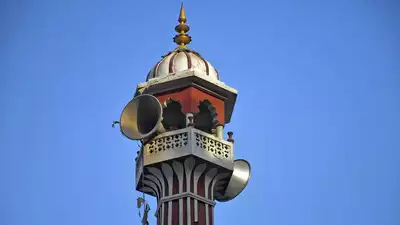The Gujarat High Court says: It’s ‘Faith and Practice Going on for Years Together’
Nov. 29: The Gujarat High Court on Tuesday dismissed a Public Interest Litigation (PIL) which sought a ban on the use of loudspeakers in mosques for azaan, terming it a “wholly misconceived PIL,” reports Live Law.
The petitioner had requested a ban on the use of loudspeakers during various times of the day for the Islamic call to prayer.
Chief Justice Sunita Aggarwal questioned the petitioner’s claim of disturbance due to noise pollution, enquiring if other religious practices, such as playing music during puja or bhajan in temples, did not cause similar public disturbance.
The Chief Justice emphasised that noise pollution is a scientific issue and pressed the petitioner’s counsel to provide evidence of the alleged noise pollution caused by azaan, including details on decibel levels.
“For how many minutes the azaan goes on? Not less than 5 minutes, where is the question of noise pollution? Show us the decibels. Technically how many decibels of noise [is caused by] azaan?”
The CJ retorted, “Your DJ creates a lot of pollution. We are not entertaining this kind of PIL. It is a faith and practice going on years together and it is a moment of only 5-10 minutes. Azaan goes on for less than 10 minutes.”
READ: Gujarat HC Dismisses Plea to Ban Loudspeakers Used for Azaan
Petitioner’s counsel attempted to strengthen their case by arguing that Azaan took place during the day, and even early in the morning, but was shot down by the Chief Justice who opined that even in temples “the morning aarti with those drums and music starts early in the morning”.
“That doesn’t cause noise to anyone? Can you say that the noise of the ghanta and ghadiyal remains in the temple premises only? It doesn’t percolate out of the premises?” the Chief Justice asked.
She added, “Mr. Counsel, in 10 minutes a person is making azaan. How much pollution is caused in that 10 minutes, please tell us. Noise pollution is a scientific issue. Since you say noise pollution, if it is scientifically placed before the court, how many decibels is raised?” If there is a scientific method of assessment of pollution of noise, can you argue as per that scientific assessment, this 10 minutes of azaan is causing noise pollution?”
The Court expressed dismay at the fact that the writ petition which claimed noise pollution due to azaan had failed to make out a scientific assessment of how much noise pollution was being caused during the prayer offerings.
It further stated, “If you can argue this, we will permit you. But you are not arguing this. You have not made out any base in the writ petition. Where is the pleading with regard to the decibels? Where is the pleading with regard to the scientific method of assessment of noise pollution in the area?”
In dictating the order, the Bench held, “We fail to understand as to how the human voice making azaan through loudspeaker in the morning could achieve the decibel [level] to the extent of creating noise pollution causing health hazards to the public at large. The measurements/ assessment of noise pollution with the raising of decibel of sound is a scientific method wherein the sound created by a particular instrument, etc. can be measured to see that the sound caused by it is reaching beyond decibel permissible limit. No such foundation has been laid in the petition to demonstrate that noise created by azaan for minutes at a stretch at different hours of the day would raise the level of the sound to cause noise pollution. We therefore do not find any ground…,” she added.
The Chief Justice noted that the remaining pleas lacked substantiation based on the material in the record.
While the CJ was dictating the order, the counsel interrupted, referencing a judgement from the Allahabad High Court, asserting the need for permission from police authorities. However, the CJ promptly intervened, noting that judgments from the Allahabad High Court are not legally binding on their jurisdiction.




